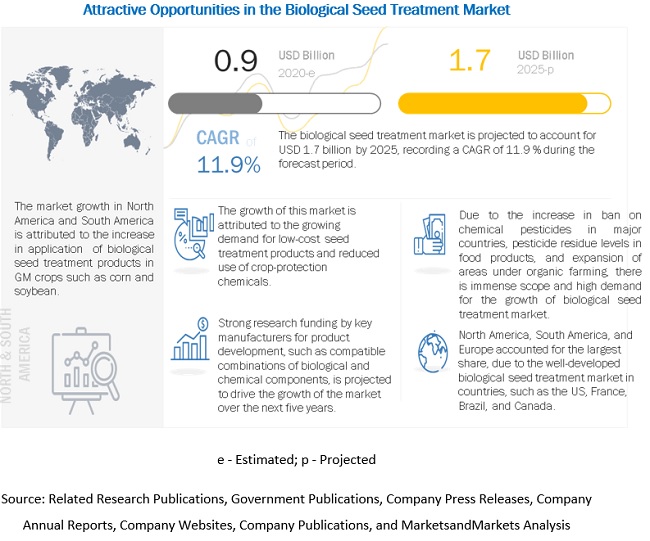The report "Biological Seed Treatment Market by Type (Microbials and Botanicals), Crop (Corn, Wheat, Soybean, Cotton, Sunflower, and Vegetable Crops), Function (Seed Protection and Seed Enhancement), and Region - Global Forecast to 2025", is projected to reach USD 1.7 billion by 2025, from USD 0.9 billion in 2020, at a CAGR of 11.9% during the forecast period. The market is driven by factors such as high demand for sustainable agriculture in the global market, lesser risks of exceeding pesticide MRLs, and insurance to seed investments.
Opportunities: Use of bio-priming techniques for improved efficacy
Bio-priming is a process of a biological seed treatment that refers to a combination of seed hydration and inoculation of the seed with microbes. In most cases, microbial inoculants, such as plant growth-promoting rhizo-microorganisms (bacteria or fungi), are used for the purpose of bio-priming of seeds. It is an environment-friendly ecological approach using selected microorganisms that enhance plant growth by producing plant growth-promoting substances, enhancing nutrient uptake, or protecting seedlings/plants against soil-/seed-borne plant pathogenic organisms. The use of such techniques is on the rise as chemicals used for seed treatment mostly act as contact fungicides that are unable to protect the plants from foliar pathogens during the later stages of crop growth.
Download PDF Brochure: https://www.marketsandmarkets.com/pdfdownloadNew.asp?id=162422288
Challenges: Inconsistent performance and incompatibility with certain pesticides
The features of biological seed treatments that have discouraged investment are their inconsistent results. The most common problems encountered during the usage of such products include desiccation and environmental conditions that discourage their growth. Successful inoculants with one crop may not work as effectively with another crop. For instance, Trichoderma is more effective for the increase in yield in tomatoes than cucumbers. Choosing just one or two microbes is not as effective as loading with an entire community. However, effectiveness can sometimes be increased by a combination of microbes, with various growth requirements. For instance, fungi can be combined with PGPR.
By type, microbials segment is projected to dominate the seed treatment market during the forecast period.
The biological seed treatment market, by type, has been segmented into microbials, botanicals, and others (biofermentation products and natural polymers & derivatives). The microbials industry dominated the market in 2020, due to the increasing demand for microbial seed treatments, in field crops such as soybean and corn.
Many key companies, such as Bayer AG (Germany), Syngenta Group (Switzerland), and Corteva Agriscience (US), offer iinovative biological seed treatment solutions for controlling seed and soil-borne diseases in a broad range of crops. This exponential growth in this North America region is attributed to government subsidies, increasing need to improve and protect food production, and rising awareness of biological seed treatment.
Make an Inquiry:
North America is projected to be the fastest-growing market
The major reason for the biological seed treatment market experiencing such a high growth rate is the highly streamlined product registration process, which makes it easier for most private companies to launch their products easily. Lower investment requirements and limited gestation period involved in the development and commercialization of biological products are key factors attracting a large number of startup companies in the industry. Additionally, growing awareness among consumers against synthetic chemicals has also led to higher adoption of these products.
This report includes a study of marketing and development strategies, along with the product portfolios of leading companies. It also includes the profiles of leading companies such as BASF SE (Germany), Bayer AG (Germany), Syngenta Group(Switzerland), Corteva Agriscience (US), Valent BioSciences (US), Verdesian Life Sciences (US), Plant Health Care (US), Precision Laboratories (US), Koppert Biological Systems (Netherlands), Italpollina (Italy), Marrone Bio Innovation (US), Certis Europe (Netherlands), UPL Limited (India), Novozymes A/S (Denmark), IPL Biologicals (India), Rizobacter (Argentina), Bioworks, Inc (US), Advanced Biological Marketing (US), Kan Biosys (India), and Incotec (Netherlands).

No comments:
Post a Comment